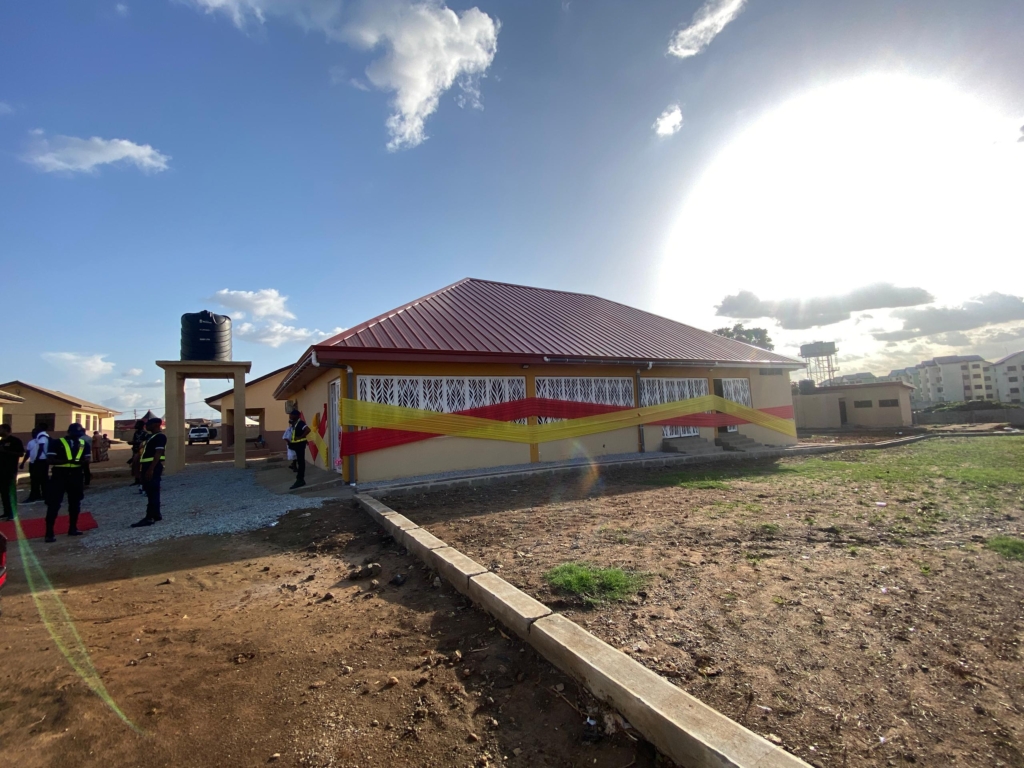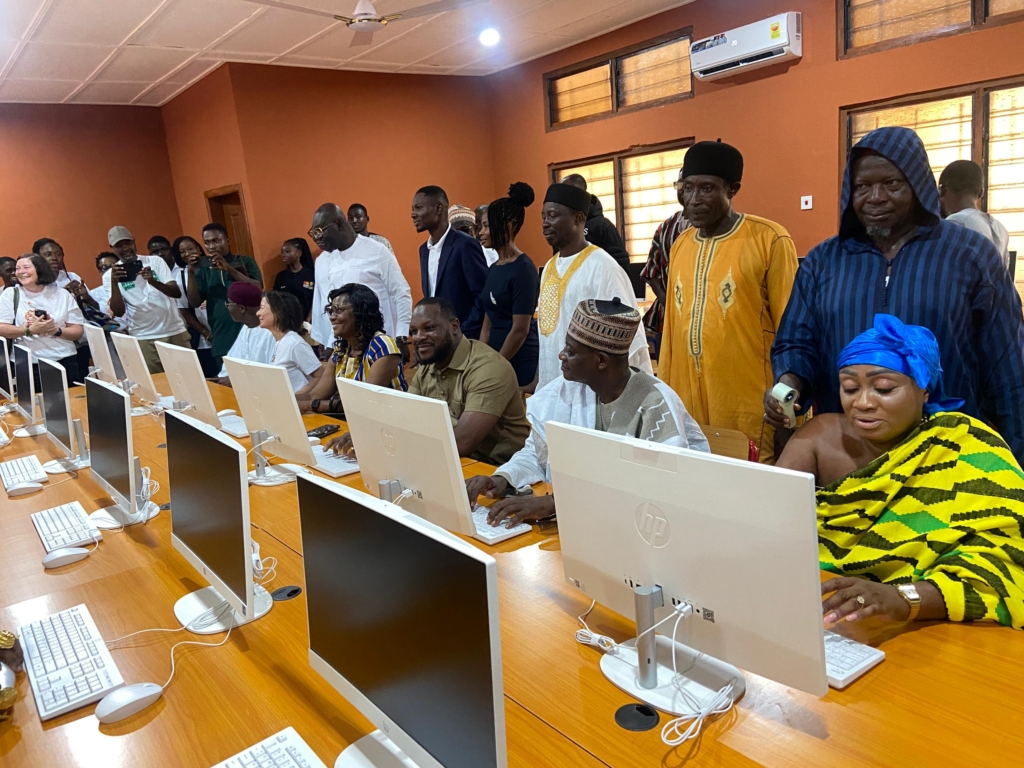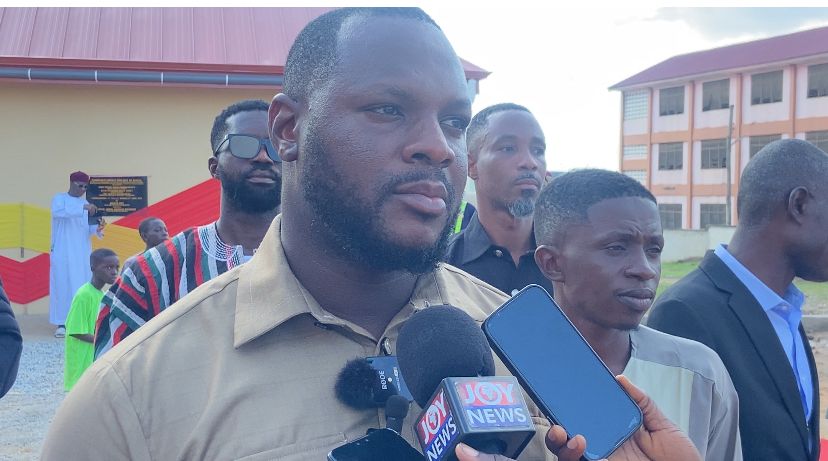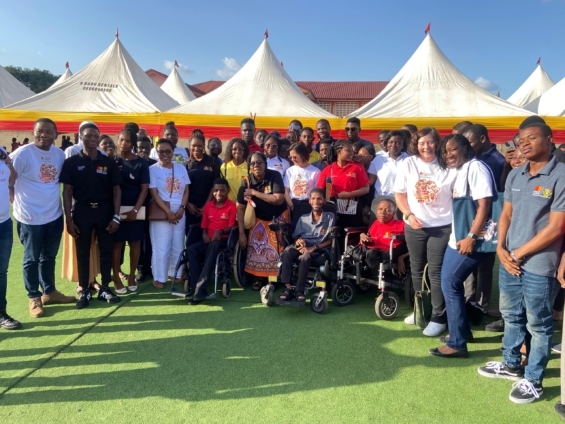
Audio By Carbonatix
The cluster of schools in Ayigya in the Ashanti region struggled with shared toilet facilities, water scarcity, and encroachment due to a lack of a wall, compromising teaching, learning and safety.
The KNUST MasterCard Scholars have intervened, transforming the cluster through a series of impactful projects, including the construction of a perimeter wall, sinking a mechanised borehole, renovating classrooms, building a sanitary facility, and establishing an ICT lab.

These interventions will improve teaching and learning, ensure clean water, enhance sanitation, and bridge the digital divide for the Ayigya community.
The Ayigya schools, Ayigya M/A Primary School and Ayigya M/A JHS have not seen any major renovation since establishment in 1954.
The schools share the same toilet facility and water source with the Ayigya community, straining the convenience of both school staff and pupils.
The school lacked a wall, facing disturbances from outside communities.

Teaching and learning of ICT were limited due to the lack of IT resources.
MasterCard Scholars at the Kwame Nkrumah University of Science and Technology, in fulfillment of their community duties, have alleviated the school of these struggles.
Headteacher of Ayigya Junior High School, Eric Amankwaah, highlighting the usefulness of the intervention, said they will ensure learners’ success.
“Walking on the school premises will provide a safe and secure environment for our learners to learn and grow. The ICT lab will enable learners to thrive in today's digital landscape. And the renovation of classrooms will revitalise our learning spaces and make them conducive for academic excellence. There will be access to clean water, which is a fundamental necessity for our learners' health and well-being. These projects demonstrate the foundation's dedication to creating a supportive and inclusive learning environment,” he said.

The scholars spent over two million Ghana cedis to fence the school premises, renovate dilapidated classrooms, sink a mechanised borehole, construct a sanitary facility, and fully equip a modern ICT lab.
President of the Scholars Council, Jeremiah Ampah, says the interventions are a contribution to breaking barriers and giving education and equal rights to the underprivileged.
“This project is more than just brick and mortar; it is a promise. It started with fencing the school for safety and order. Then came the borehole, clean water for learning and living. We renovated and painted classrooms to restore dignity and create a better atmosphere for learning.
“Yet, as we went deeper, we discovered pressing needs: A shared toilet facility used by both the school and the larger community, an urgent sanitation challenge. The absence of a computer lab, limiting access to the digital world. So, as a community of Scholars, we said: If the job must be done, it must be done and done well. Thus, we built and commissioned today a fully furnished Computer Laboratory and a modern, hygienic sanitary facility,” he said.
Oforikrom Municipal Chief Executive, Anwel Sadat Ahmed lauded the collaborative efforts, and assured that the assembly is open to collaborate to alleviate situations in the municipality.
“We are deeply grateful for the MasterCard Foundation's partnership and their commitment to making KNUST a hub of youth empowerment. We are confident that this project will make a significant impact on the lives of young people, providing them with the opportunities they deserve to succeed.

“Together, we can build a brighter future for our community. The Assembly remains open and ready for more collaborations and support of this nature to ensure that every child and every school in our municipality can thrive,” he said.
The Lead of the Mastercard Foundation Programs at KNUST, Prof. Kofi Ohene Owusu-Daaku, said the intervention is a fulfilment of the scholars’ duties as transformational leaders.
“These projects are called community impact projects, and it’s in fulfilment of a block of our ethos, thus giving back to a struggling society. We have over 1,210 scholars now. The aim is to train ethical and transformative leaders who will form the vanguard of our societies,” he said.
Latest Stories
-
Minimie Atsomo launches “Laugh It Off” creator challenge to celebrate Ghanaian humour and creativity
1 minute -
Middle East crisis: Ablakwa assures all Ghanaians will be supported
6 minutes -
Voting underway in Ayawaso East as over 49,000 voters head to polls across 113 centres
16 minutes -
Bond market: Turnover rose by 43% to GH¢2.98bn
16 minutes -
Banks wrote off GH¢1.64 billion in 2025, NPL stock hits GH¢21.0 billion – BoG
21 minutes -
Let’s brace ourselves for Middle East war fallout—President Mahama to African leaders
21 minutes -
China removes three retired generals from national advisory body
23 minutes -
Andre Ayew’s 2026 World Cup inclusion won’t surprise me – Kofi Adams
24 minutes -
World Sustainability Organization launches Friend of the Earth sustainable packaging certification in Ghana
38 minutes -
14-year-old boy seriously injured following alleged abuse in Ashanti Region
43 minutes -
Nana Agradaa walks free from prison after release
47 minutes -
Man arrested for alleged assault after accident at Maamobi
56 minutes -
Government urged to review compensation fund to support vulnerable accident victims
59 minutes -
Photos: Hasaacas Ladies beat Army Ladies to go top of WPL table
59 minutes -
Let’s fix flaws in our democratic governance to preserve the 4th Republic – Boakye Agyarko
1 hour

